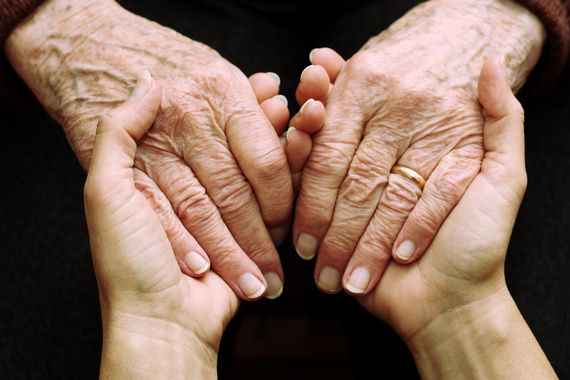My mother was diagnosed with Alzheimer's last summer. The signs had been visible for a while, of course, but I refused to accept it. Then, after a fall caused by her increasing confusion, a subsequent operation, and a longer stay in the hospital, the doctors gave an unambiguous diagnosis and there was no more denial. When I picked up my mother from the hospital to bring her home, it suddenly became clear to me that she had become dependent on care and that I would have to organize her entire life from now on.
However, the organizing was not the most challenging part. Dealing with my emotions was much harder. It was difficult for me to accept that the roles were now reversed. My mother had become my child, and I her mother. How was I supposed to cope with my sorrow when she asked me, "What's wrong with me? What happened?"
I made a lot of mistakes. I became impatient, argued with her, once I even yelled at her, and another time I started crying with frustration in front of her.
But I wanted our time together to be nice and harmonious, and slowly I was able to deal with her and the situation better. What I learned during the development of my mother's disease enriched my life and my relationships, and I am grateful for this.
1. Living in the here and now
I always thought "living in the here and now" was good in theory, but usually I couldn't actually put it into practice. My mother taught me to focus my life on the present. The "here and now" is all that exists for her. Talking to her about the past is usually senseless - unless it's about things that happened a long time ago - and she's not interested in planning for the future. So we concentrate entirely on what we are doing right now. On our walks, on a hair appointment, on a family gathering. I learned from her how to be present and aware and to live life deliberately. I was asked once why I do any activities with my mother, since she just forgets it the next day anyway. The answer is very clear for me now: Because the present moment is precious.
2. Paying attention to your own feelings when you are with others
My mother reacts very sensitively to my feelings and moods. That is typical of Alzheimer's patients. When I visit her feeling hectic and tense, she reacts immediately, takes on my mood, and becomes nervous and negative. But when I am cheerful and attentive, she is happy. This has taught me to be much more aware of myself and my feelings when I am with other people. Every meeting, no matter how trivial the occasion, I try to approach now with positive energy.
3.Being tolerant
I always thought I was very tolerant, but in reality, my tolerance ran out as soon as someone deviated from what I considered "right." With my mother I can now really work on being tolerant. Through her illness she has developed a childlike tactlessness, which very often leads to situations that could be considered embarrassing. Eating out in restaurants, for example, is a bit tricky when she shouts at the waiter that the food is so bad (eating is an issue in itself for Alzheimer's patient) or talks about people at the next table in a loud voice ("Look at that horrible outfit!"). Of course I make sure that my mother doesn't offend anyone, but I've stopped complaining about others self-righteously ("How could they!") and have become more tolerant.
4. Avoiding pointless conflict
Conflict and arguments with my mother are pointless. I could spend hours with her discussing whether it is now 2014 or already 2015. When we run the risk of ending up in a discussion like this, I change the topic or resort to humor, which actually always works. Many of the arguments (not all) I've had in my life now seem equally unnecessary and I feel sad when I think about it, because I wasn't a big enough person to avoid them. Now I try to sidestep pointless conflict.
5. No judging
When my grandmother developed dementia and became dependent on care, my mother put her in a nursing home where she lived another 15 years. She only visited her a few times a year. I can't remember my mother ever doing any activities with my grandmother or being involved in her care in any way. But that has nothing to do with my caring for my mother. I accept her actions. It was her life, her decision, even if I don't agree with it. Life should not be about keeping score. It is not my job to be a judge, neither of my mother nor of other people. My job is to concentrate on doing what I think is right.
6. Everything has special value
When my mother got sick I didn't want to burden my two daughters with it. They are young and have enough going on with their education, starting their careers, and their relationships. I felt that it was simply my job as my mother's daughter.
The most wonderful discovery I've made through my mother's disease may be that my children not only offer to help me when they sense that I'm feeling overwhelmed, but that they take care of my mother on their own initiative. They visit her often, play cards with her, look at photo albums together from when they were little and when "Grandma" did a lot of things with them. Just because they want to.
It shows me that it's all worth it.
Earlier on Huff/Post50:

